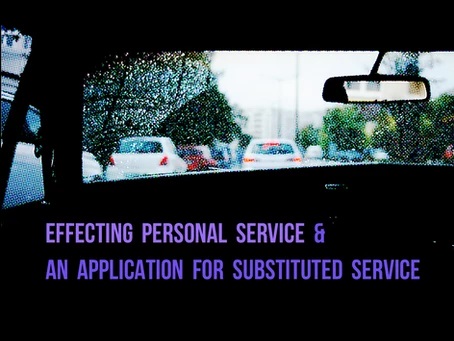

A pitfall often faced by legal representatives during the debt recovery legal process is the difficulty of effecting personal service on an individual with documents filed in court.
If personal service is unable to be effected, it can create delays in the proceedings and can cause a person or individual to incur further costs.
Local Court Proceedings
Pursuant to rule 10.20 2(b) of the Uniform Civil Procedure Rules 2005 any document filed in the Local Court required or permitted to be served on a person may be personally served in one of the following ways:
- Personally, by serving the document on the defendant;
- By leaving the document addressed to the defendant, at the defendant’s business or residential business with a person who is apparently of or above the age of 16 years and apparently employed or residing at that address; and
- By service from the Local Court, via post to the defendant’s business or residential address in an envelope marked with a return address.
The most common method of effecting service on a defendant in Local Court proceedings is by way of personal service.
Supreme Court Proceedings
Pursuant to rule 10.20 2(a) of the Uniform Civil Procedure Rules 2005 any originating process, and any order for examination or garnishee order, in proceedings in the Supreme Court must be personally served.
It is recommended that the plaintiff request an external skip trace be conducted by debt recovery and investigation companies in an attempt to locate the defendant. Should this be unsuccessful and you are unable to personally serve an individual with the document, you can apply to the Local Court and Supreme Court of New South Wales for substituted service to serve documents that cannot practically be served on the person (pursuant to Uniform Civil Procedure Rules 2005 10.14 (1)(a)).
The results from the external skip trace conducted on the individual will be included in the supporting affidavit as evidence showing that attempts have been made to locate the individual. The affidavit in support of the application for substituted service must include a statement as to the applicant’s knowledge of the whereabouts of the person to be served, and a statement as to any communications that have occurred between the applicant and the person to be served since the cause of action in the proceedings arose i.e. email or social media.
The Court may make orders specifying the steps that may be taken to enable the document to be brought to the attention of the defendant.
The plaintiff is to obey to the Court’s orders and take the specified steps to bring the document to the individual’s attention. Once this has occurred the Statement of Claim is then to be deemed served.
This alternative and non-traditional means to serve an individual should they be unable to be personally served with documents, enables an individual or company to overcome a pitfall that often arises within the debt recovery legal process.

